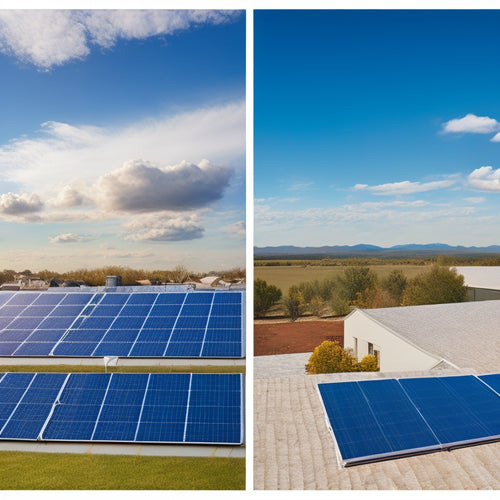
Best Home Solar Power Systems This Year
Share
You're in the market for a high-quality home solar power system that checks all the right boxes: maximum energy production, minimal costs, and a reliable source of renewable energy. Leading brands like SunPower, Panasonic, and Tesla offer high-efficiency panels with advanced designs that maximize energy output. Look for systems with efficiency ratings above 20%, durable panels with 25-year warranties, and optimized system design for peak performance. Budget-friendly options abound, including affordable panels, low-cost installation methods, and government incentives. To make the most informed decision, consider factors like inverter selection, energy storage solutions, and high-quality warranties. Now, take the next step towards utilizing the power of solar energy for your home.
Key Takeaways
- Top solar panel brands like SunPower, Panasonic, and Tesla offer high-efficiency panels with advanced designs for maximum energy production.
- System efficiency and durability are crucial, with a warranty period of 25 years or more and efficiency ratings above 20% being key factors.
- High-efficiency panels generate more power per hour of sunlight, and optimal system design and advanced inverters enhance energy production.
- Budget-friendly solar options, including affordable panels and low-cost installation methods, make solar energy more accessible to homeowners.
- Energy storage solutions like battery backup systems and grid tie options ensure a reliable energy supply and enhance energy independence for homeowners.
Top Solar Panel Brands
When it comes to utilizing the power of the sun, the quality of your solar panels can make all the difference. You need a reliable brand that can capture the sun's energy efficiently, and that's where top solar panel brands come in.
Staying ahead of the curve in solar technology trends, industry leaders like SunPower, Panasonic, and Tesla are pushing the boundaries of solar panel innovations. These brands offer high-efficiency panels with advanced features like bifacial technology, which can increase energy output by up to 25%.
You'll also find state-of-the-art designs that maximize energy production while minimizing space requirements. With these top brands, you can trust that your solar panel system will perform effectively, even in less-than-ideal weather conditions.
System Efficiency and Durability
You expect your solar power system to perform at its best, even in less-than-ideal conditions. After all, utilizing renewable energy is about reliability and consistency.
When evaluating system efficiency and durability, you should focus on two key aspects: solar panel longevity and efficiency ratings.
Solar panel longevity is critical, as it directly impacts the system's overall performance. Look for panels with a proven track record of withstanding harsh weather conditions, such as extreme temperatures, humidity, and UV exposure. A longer warranty period (25 years or more) is often a good indicator of a panel's durability.
Efficiency ratings, on the other hand, determine how much electricity your system can generate per unit area. Higher efficiency ratings (above 20%) translate to more power output and reduced installation costs.
Be sure to check the manufacturer's efficiency ratings, as they can vary considerably between models. By considering both solar panel longevity and efficiency ratings, you can guarantee your system operates at peak performance, providing you with a reliable source of clean energy for years to come.
Most Energy-Producing Systems
Optimum energy production is the ultimate goal of any solar power system. You want to maximize the amount of electricity generated from the sun's energy. To achieve this, you need to focus on solar panel technology and energy production efficiency.
When it comes to energy production, not all solar panels are created equal. High-efficiency panels can generate more power per hour of sunlight than lower-efficiency ones. Look for panels with high power output ratings (measured in watts) and high efficiency ratings (measured as a percentage). Top-tier panels can have efficiencies of up to 22% or more.
You should also consider the system's overall design and configuration. A well-designed system with optimized panel placement, tilt, and orientation can greatly enhance energy production.
Additionally, advanced inverters that can handle high DC input voltages and have high conversion efficiencies can also contribute to increased energy production. By prioritizing energy production efficiency, you can get the most out of your solar power system and reduce your reliance on the grid.
Budget-Friendly Solar Options
You're likely looking for solar power systems that won't break the bank, and fortunately, there are budget-friendly options available.
Affordable solar panels with lower efficiencies can be a cost-effective choice, and low-cost installation options, such as DIY installation or group purchasing, can also help reduce upfront costs.
Additionally, energy savings plans can help you recoup your investment over time.
Affordable Solar Panels
Solar panel systems, once regarded as a luxury, have become increasingly affordable in recent years, making it possible for homeowners to harness the power of the sun without breaking the bank.
You can now choose from a range of budget-friendly solar panel types, including monocrystalline, polycrystalline, and thin-film panels, each offering varying levels of efficiency and cost-effectiveness.
When selecting an affordable solar panel system, you'll want to evaluate the upfront cost, as well as the long-term savings.
Government incentives, such as the Solar Investment Tax Credit (ITC), can help offset the initial investment, making solar energy an even more attractive option.
With the ITC, you can claim a tax credit of up to 26% of the total cost of your solar panel system.
Additionally, many states and utilities offer rebates and discounts, further reducing the cost of going solar.
Low-Cost Installation Options
As you investigate affordable solar panel systems, considering the installation process is essential to keeping costs down.
You'll want to examine low-cost installation options that meet your budget and energy needs. One approach is to opt for DIY installations, where you handle the installation process yourself. This can greatly reduce labor costs, but be prepared to invest time and effort into the process.
Alternatively, you can look into financing options that allow you to spread the installation cost over time. Many solar panel companies offer financing plans or partnerships with lenders to make installation more accessible.
Additionally, consider working with local installers who may offer more competitive pricing than larger national companies. By assessing these options, you can find an installation solution that fits your budget and gets you on the path to utilizing solar power.
Energy Savings Plans
Energy Savings Plans (Budget-Friendly Solar Options)
You're likely considering solar power to reduce your energy expenses. Energy savings plans can help you achieve this goal without breaking the bank. Government incentives and financial rebates can greatly lower the upfront cost of solar panel installation.
In addition, community solar programs allow you to share the benefits of solar energy with your neighbors, reducing the financial burden. Net metering enables you to generate your own electricity and export any excess to the grid, offsetting your energy consumption.
Solar leasing options are also available, where you can rent solar panels and benefit from reduced energy bills without the initial investment. Before investing in a solar system, consider conducting an energy audit to identify areas of energy inefficiency in your home. This will help you maximize your energy savings.
Moreover, tax credits can provide a considerable percentage of your solar installation cost back as a refund. Joining solar cooperatives can also provide access to discounted rates and group purchasing power.
Best Inverters for Homes
By the time you've selected your solar panels, you're likely enthusiastic to convert that DC power into usable AC electricity for your home. This is where inverters come in - an essential component in your solar power system. Inverters convert DC power from your solar panels into AC power that your home can use.
When choosing an inverter, you'll want to take into account the type and efficiency. There are three main inverter types: string inverters, microinverters, and power optimizers. Each has its advantages, but string inverters are the most common and cost-effective.
| Inverter Type | Efficiency | Advantages |
|---|---|---|
| String Inverter | 95-98% | Cost-effective, easy installation |
| Microinverter | 95-97% | Module-level monitoring, increased energy yield |
| Power Optimizer | 97-99% | Advanced monitoring, increased energy yield |
Inverter efficiency is also a significant factor, as it directly affects how much power your system produces. Look for inverters with high efficiency ratings, typically above 95%. By selecting the right inverter for your solar power system, you'll be able to maximize your energy production and enjoy the benefits of clean, renewable energy.
Energy Storage Solutions
You'll want to evaluate energy storage solutions to guarantee a steady power supply when the sun isn't shining or during grid outages.
Battery backup systems can provide a reliable source of energy when you need it most, while grid tie options allow you to store excess energy generated during the day for later use.
Battery Backup Systems
As your home solar power system generates electricity, a vital factor is how to store excess energy for later use, particularly during power outages or at night when the sun isn't shining. A battery backup system is an essential component of your overall energy storage solution, allowing you to capture and make use of the energy your solar panels produce.
When selecting a solar battery type, you'll need to take into account factors such as depth of discharge, round-trip efficiency, and warranty duration. Popular solar battery types include lead-acid, lithium-ion, and saltwater batteries, each with their own strengths and weaknesses. For instance, lithium-ion batteries offer high energy density and long lifetimes, but come at a higher upfront cost.
During installation, evaluate the system's configuration, including the number of batteries, inverter compatibility, and charging/discharging parameters. A well-designed battery backup system will guarantee seamless integration with your solar power system, providing reliable backup power when you need it most.
Grid Tie Options
Grid tie options, also referred to as energy storage solutions, allow homeowners to store excess energy generated by their solar panels during the day for use during the night or when the grid goes down. This allows you to take advantage of net metering benefits, offsetting your energy consumption during the night with the excess energy produced during the day.
By storing excess energy, you can reduce your reliance on the grid, increasing your energy independence and saving you money on your utility bills.
Grid tie options also contribute to grid stability by reducing the strain on the grid during peak hours. When the grid is under heavy load, your stored energy can be fed back into the grid, helping to stabilize the system.
This not only benefits you but also your community, as a stable grid guarantees a reliable supply of power. With grid tie options, you can enjoy the benefits of solar power while also supporting the overall energy infrastructure.
Installation and Maintenance
Installing a home solar power system requires careful planning and execution to guarantee peak performance and longevity. You'll want to confirm your system is installed at the ideal angle and direction to maximize energy production.
It's also essential to select a qualified installer who follows solar installation tips, such as securing panels to the roof and connecting them to an inverter.
During installation, pay attention to the type of mounting system used, as it can affect the system's overall efficiency. For example, a tracking system can increase energy production by up to 45%.
Additionally, consider the inverter's capabilities, as it plays a significant role in converting DC power to AC.
When it comes to maintenance, adopt best practices such as regularly cleaning the panels to confirm maximum energy absorption.
You should also perform routine checks on the system's electrical connections and inverters to prevent faults.
Moreover, keep an eye out for signs of wear and tear, such as loose connections or damaged panels, and address them promptly to prevent system downtime.
Warranties and Customer Support
Your solar panel system's warranty and customer support can be an important factor in your overall satisfaction with the system. When considering different solar power systems, it's vital to evaluate the warranty coverage and customer service offered by each manufacturer. A thorough warranty can provide you with peace of mind, knowing that you're protected in case of system malfunctions or defects.
-
Look for manufacturers that offer at least a 25-year warranty on their solar panels and inverters.
-
Check if the warranty covers parts, labor, and transportation costs.
-
Confirm the manufacturer has a dedicated customer service team that can assist you with any issues or concerns.
A reliable customer service team can help you troubleshoot problems, schedule maintenance, and provide guidance on system optimization.
When reviewing customer support, consider factors such as response times, communication channels, and online resources.
Frequently Asked Questions
Can I Install Solar Panels on a Metal or Clay Tile Roof?
You'll need to contemplate unique installation considerations for metal or clay tile roofs, ensuring secure fastening and waterproofing; consult with a professional to determine the best approach for your roof type, as improper installation can compromise the system's integrity.
Do Solar Panels Work During Power Outages?
You're wondering if solar panels work during power outages, like a lighthouse in the dark. Unfortunately, they typically don't, unless you have energy storage solutions in place, which enable your solar power functionality to shine even when the grid goes down.
Can I Sell Excess Energy Back to the Grid?
You can sell excess energy back to the grid through an energy buyback program, which requires a grid connection; this arrangement allows you to offset your energy bills and maximize your solar investment's return.
Are Solar Panels Affected by Shade or Tree Cover?
You'll notice a significant drop in solar panel efficiency when shade or tree cover blocks sunlight, as even partial shading can reduce energy output by up to 50%, emphasizing the importance of ideal panel placement and maintenance.
Can I DIY Install My Home Solar Power System?
You'll need a superhero's patience to DIY install your home solar power system, but with careful planning, you can conquer it; just make certain you've got the right system components and installation tools to avoid a catastrophic failure!
Related Posts
-

10 Essential Bike Lane Safety Features to Consider
You're designing a bike lane with safety in mind, and that's essential. The National Highway Traffic Safety Administr...
-

What Role Do Unicycles Play in Urban Transport?
As you navigate through congested city streets, unicycles emerge as a viable solution, slashing carbon emissions by u...
-

Tracking Solar Panels Vs Fixed Panels Cost Savings
When considering solar panel options, you'll want to weigh the cost savings of tracking solar panels versus fixed pan...


